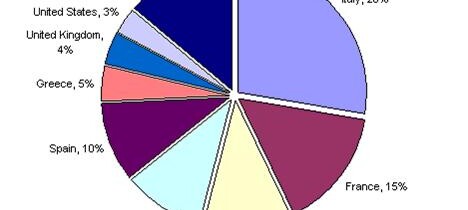Putting Two & Two Together
I just had to get this out of my system…
For the record I think whatever is happening in Libya is the calling of its own people. I am not in a position to take sides with the coalition forces or Gaddaffi. However, I can at least raise a concern around the somewhat fluid rational backing the use of force. This post is a reaction to the reports that state “there have been no significant civilian casualties.”
For starters, lets draw parallels between the current situation in Libya and one that Pakistan faced. For context, May 19th 2009, the Pakistan army starts operations in Swat against 'National Interests' to restore the “writ of the state.”1 Pretty similar to what the Colonel was trying to do, in my opinion – restore the writ of the state.
Infact! We were pushed to take an expeditious action. “We would like them [Pakistan] to move tomorrow, we would like them to take out these people tomorrow,” said Munter. “But we understand they're telling us honestly about the capacity of their military, and when they are able, we are convinced they will move in” where the views of US Ambassador Cameron Munter, emphasised on Dec 17, 2010 in a news conference at the US embassy that addressed Pakistan's tackling of the militant sanctuaries on the Pakistan side of the border.2
Furthermore, very recently January 13th 2011, US countrymen were being advised by Mr. Biden, US vice president that “Societies that tolerate such [extremist] actions wind up being consumed by those actions.”3 He didn't mention of the UN Security Council resolution 1973, the pretext behind the strikes in Libya.
So, I am left wondering how different is Libya's situation than ours was – such that it warrants military action against the current “regime.” Do remember that Tunisia, Egypt, Yemen, Bahrain & even Saudi Arabia had/have people revolting against the ruling monarchs (for lack of better word); which have been a more “stiffer tests of American power and resolve “as stated by Mark Mardell of BBC America.4
Daniel Hannan from The Telegraph makes an interesting point as well:
“There have been three moments in my lifetime when, under all the norms of international relations, a case could have been made for military intervention against the Tripoli regime: the murder of Yvonne Fletcher; the Lockerbie atrocity; and the revelation that Gaddafi had been supplying arms to the IRA. As far as I can remember, there was almost no demand for an armed strike on any of those occasions; indeed, Margaret Thatcher came in for a great deal of criticism for allowing US bombers to fly from RAF bases in retaliation for Libyan state terrorism. Yet many of the same people who criticised her are now beating their chests and demanding action. Have we reached the point where military action is thought to be justified only when there isn't any national interest at stake?”5
Digressing a little from what Daniel say on national interest, British interests in Libya are reflected in the trade that took place in the last few years:
1. In 2009 UK exports of goods to Libya were worth £423mn. (Source: HMRC Overseas Trade Statistics)
2. In 2008 UK exports of services to Libya were worth £244mn (Source: ONS Balance of Payments Pink Book).
3. It is estimated that 150 UK companies operate in Libya.
Well known UK-based companies that are active in the Libyan market, include: Biwater, AMEC, British Airways, Mott MacDonald, Halcrow, Bhs, Marks & Spencer, Monsoon Accessorize, G4S, HSBC, Corus International, KPMG, GSK, AstraZeneca, JCB, Rentokil, Ernst & Young, PWC and Land Rover.6
Finally, being an oil man, I did have to look at the exports that Libya makes and here is a snap shot of the countries that are dependent on Libyan Oil.
 7
7
According to official trade data, in 2008 the majority of Libyan oil exports were sold to European countries like Italy (523,000 barrels a day), Germany (210,000 barrels a day), Spain (104,000 barrels a day) and France (137,000 barrels a day). The US Energy Information Administration estimates the United States imported an average of 102,000 barrels of oil a day from Libya in 2008, up from 56,000 barrels a day in 2005.In 2008, this meant around seven per cent of Libya's exports went to the US, compared to around three per cent to the UK, according to the EIA/Global Trade Atlas.8
Incidentally today's papers read: “France, in diplomatic terms, has been one of the main promoters of UN Security Council resolution 1973 allowing the use of force. US and Britain have also been key players. Canada, Italy, Spain, Belgium and Qatar are also offering military support.9
Having said that I will leave it to you to put your own two's together. For those who do want to read further, I would recommend 'The eloquence of action' on Mark Mardell' America. Reference can be found in the foot note.
For the record I think whatever is happening in Libya is the calling of its own people. I am not in a position to take sides with the coalition forces or Gaddaffi. However, I can at least raise a concern around the somewhat fluid rational backing the use of force. This post is a reaction to the reports that state “there have been no significant civilian casualties.”
For starters, lets draw parallels between the current situation in Libya and one that Pakistan faced. For context, May 19th 2009, the Pakistan army starts operations in Swat against 'National Interests' to restore the “writ of the state.”1 Pretty similar to what the Colonel was trying to do, in my opinion – restore the writ of the state.
Infact! We were pushed to take an expeditious action. “We would like them [Pakistan] to move tomorrow, we would like them to take out these people tomorrow,” said Munter. “But we understand they're telling us honestly about the capacity of their military, and when they are able, we are convinced they will move in” where the views of US Ambassador Cameron Munter, emphasised on Dec 17, 2010 in a news conference at the US embassy that addressed Pakistan's tackling of the militant sanctuaries on the Pakistan side of the border.2
Furthermore, very recently January 13th 2011, US countrymen were being advised by Mr. Biden, US vice president that “Societies that tolerate such [extremist] actions wind up being consumed by those actions.”3 He didn't mention of the UN Security Council resolution 1973, the pretext behind the strikes in Libya.
So, I am left wondering how different is Libya's situation than ours was – such that it warrants military action against the current “regime.” Do remember that Tunisia, Egypt, Yemen, Bahrain & even Saudi Arabia had/have people revolting against the ruling monarchs (for lack of better word); which have been a more “stiffer tests of American power and resolve “as stated by Mark Mardell of BBC America.4
Daniel Hannan from The Telegraph makes an interesting point as well:
“There have been three moments in my lifetime when, under all the norms of international relations, a case could have been made for military intervention against the Tripoli regime: the murder of Yvonne Fletcher; the Lockerbie atrocity; and the revelation that Gaddafi had been supplying arms to the IRA. As far as I can remember, there was almost no demand for an armed strike on any of those occasions; indeed, Margaret Thatcher came in for a great deal of criticism for allowing US bombers to fly from RAF bases in retaliation for Libyan state terrorism. Yet many of the same people who criticised her are now beating their chests and demanding action. Have we reached the point where military action is thought to be justified only when there isn't any national interest at stake?”5
Digressing a little from what Daniel say on national interest, British interests in Libya are reflected in the trade that took place in the last few years:
1. In 2009 UK exports of goods to Libya were worth £423mn. (Source: HMRC Overseas Trade Statistics)
2. In 2008 UK exports of services to Libya were worth £244mn (Source: ONS Balance of Payments Pink Book).
3. It is estimated that 150 UK companies operate in Libya.
Well known UK-based companies that are active in the Libyan market, include: Biwater, AMEC, British Airways, Mott MacDonald, Halcrow, Bhs, Marks & Spencer, Monsoon Accessorize, G4S, HSBC, Corus International, KPMG, GSK, AstraZeneca, JCB, Rentokil, Ernst & Young, PWC and Land Rover.6
Finally, being an oil man, I did have to look at the exports that Libya makes and here is a snap shot of the countries that are dependent on Libyan Oil.
According to official trade data, in 2008 the majority of Libyan oil exports were sold to European countries like Italy (523,000 barrels a day), Germany (210,000 barrels a day), Spain (104,000 barrels a day) and France (137,000 barrels a day). The US Energy Information Administration estimates the United States imported an average of 102,000 barrels of oil a day from Libya in 2008, up from 56,000 barrels a day in 2005.In 2008, this meant around seven per cent of Libya's exports went to the US, compared to around three per cent to the UK, according to the EIA/Global Trade Atlas.8
Incidentally today's papers read: “France, in diplomatic terms, has been one of the main promoters of UN Security Council resolution 1973 allowing the use of force. US and Britain have also been key players. Canada, Italy, Spain, Belgium and Qatar are also offering military support.9
Having said that I will leave it to you to put your own two's together. For those who do want to read further, I would recommend 'The eloquence of action' on Mark Mardell' America. Reference can be found in the foot note.
1
2
3
4
5 http://blogs.telegraph.co.uk/news/danielhannan/100080452/libya-is-not-our-responsibility/
6 http://www.channel4.com/news/libyan-oil-where-does-it-go
7
8 http://
www.channel4.com/news/libyan-oil-where-does-it-go
9 http://www.bbc.co.uk/news/world-africa-12806112





